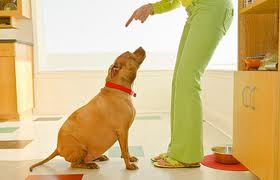Just like their owners, dogs are prone to being overweight. When a dog has extra weight on its bones, it can increase the risk of serious health conditions, including joint problems, diabetes and liver problems.
Obesity occurs when a dog gets too much food coupled with too little exercise. The dog takes in more energy than is required, which leads to a build-up of fat. Luckily, there are ways in which you can help your dog lose excess pounds and reduce health risks.
Determining if your dog is overweight
Can you feel your dog’s ribs and backbone? If not, he is likely overweight. A dog has too much fat if you have to press hard to feel his ribs. Furthermore, when looking at your dog from above, you should notice a waist. When viewed from the side, there should be a tuck in the tummy.
Ask the vet what your dog’s optimal weight should be. Anything up to 15 percent above that is considered overweight. Any weight more than 15 percent over the optimum weight is considered obese. It is common to have a have an overweight dog. In fact, more than half of all dogs fall into the overweight or obese categories.
Dogs prone to obesity
Certain breeds are prone to obesity. For small breeds, these include dachshunds, Cavalier King Charles Spaniels, Cairn terriers and Scottish terriers. Medium breeds include cocker spaniels, beagles and basset hounds. Large breeds include Rottweilers, golden retrievers and Labrador retrievers. Giant breeds include St. Bernards, Bernese Mountain Dogs and Newfoundlands.
In many cases, as hard as it may be to grasp, it is usually not the dog food causing the obesity; it’s the other stuff the dog eats. Treats and snacks, such as people food, help pack on the pounds. It’s a hard habit to break because dogs love food and their owners just want to make them happy.
Diet and exercise
A proper diet is important in getting your dog down to a healthy weight. Work with a vet to determine the correct portion size and dog food to feed. You may need to switch to a high-fiber dog food that has the right kinds of fats to keep their coat healthy, but the food should also meet their caloric needs. Your vet will determine this based on your dog’s energy level, current weight, ideal weight and overall health.
If your dog loves treats, you don’t necessarily have to cut them out altogether. Instead,
Set a daily limit. For example, once your dog has had two biscuits in one day, she can have no more until the next day. Don’t give in to begging, either. Ignore your dog when she starts to whine and bark.
You can also replace the current treats with healthy alternatives. Try low-fat options such as vegetables. Many dogs love carrots. Apples, cooked eggs and pumpkin are also good choices. Green beans have a lot of fiber and are very filling, making them great for dogs that need to lose weight.
Besides proper diet, adequate exercise is also important. It controls hunger, increases metabolism and burns calories. Your dog should have 10-15 minutes of exercise time a few times throughout the day. If you work all day, you may want to take your dog for a walk in the morning before you leave for work, and at night when you get home. Another option is to take your dog to a doggie daycare, where your dog will have the opportunity to play with other dogs. If your dog has joint problems, try a low-impact activity such as swimming.
 If none of these tips work, your vet will likely recommend a diet dog food. Many brands are organic and they contain a high amount of fiber, so that your dog eats less but feels fuller. In some cases, a vet can even offer a prescription dog food. In extreme cases, a prescription medication, Slentrol, may be recommended. It has been proven to decrease the absorption of fat and reduce hunger.
If none of these tips work, your vet will likely recommend a diet dog food. Many brands are organic and they contain a high amount of fiber, so that your dog eats less but feels fuller. In some cases, a vet can even offer a prescription dog food. In extreme cases, a prescription medication, Slentrol, may be recommended. It has been proven to decrease the absorption of fat and reduce hunger.
Obesity caused by medical problems
If you have tried everything to no avail, you should ask your vet about a possible medical condition. Your vet can perform blood work to determine if your dog has an underlying condition that is causing him to gain weight. Thyroid conditions and hormonal imbalances can cause your dog to retain extra pounds.
Tips for weight loss
- Don’t expect overnight results. You don’t want your dog to lose weight too quickly. Aim for a weekly weight loss of 1-2 percent of total body weight.
- Keep your dog away from human food. This means keeping it out of the dining room and kitchen areas.
- Aim for several small meals throughout the day instead of one huge meal in the morning.
- All food and treats should only be given to the dog in his food bowl.
- Find other ways to praise your dog and offer attention besides using treats and food.

Leave a Reply